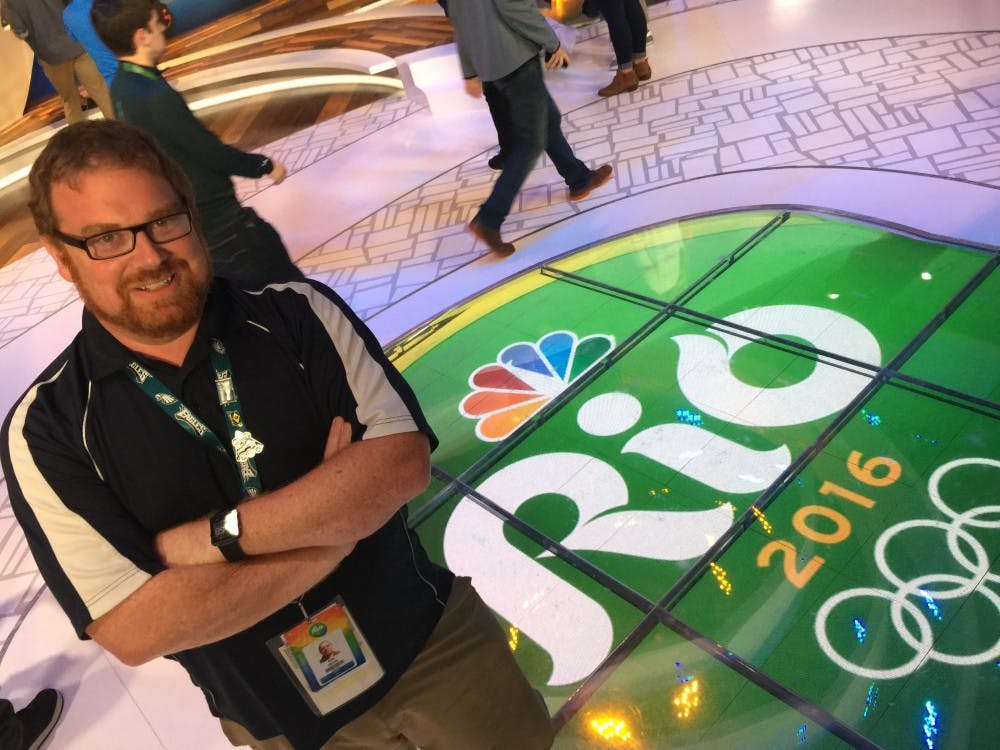Max Negin had a unique view of this summer’s Olympics, one that’ll surely translate to some compelling lectures and lessons in his Communications classes this fall at Elon University.
He worked his fifth Olympics for NBC this summer, spending 12-hour days at the International Broadcast Center in Rio de Janeiro as a digital media manager, acting as a gatekeeper of sorts for all the content that would be distributed across NBC’s platforms.
Negin, an assistant professor of communications, helped facilitate the process of content coming into the system to when it was edited and sent out to the desired network.
And now, he’ll be able to share those experiences with the students in his classes this fall, including a sports broadcasting course.
He visited with a friend in the studio and saw the way it was wired. He gleaned advice about NBC’s lower-third style that he hopes to bring to Elon Phoenix Weekly this fall. And he was able to stand in the back of an edit suite as clips were cut together for NBC’s prime-time coverage.
“I’m a cog in the machine that gets to look around everywhere and see these cool stories being made and the process happening and the technology that goes on,” Negin said. “That view of the process, I don’t get that view any other way other than being that fly on the wall.”
Negin first worked the 2008 Summer Olympics in Beijing and has been to every Games since. A lot’s changed in those eight years, particularly with the process.
NBC is no longer using physical media — it’s strictly digital. And every year’s a new challenge, considering it’s typically a group of folks who have never met trying to learn, get trained on and teach a new system and workflow.
So in Rio, the media management team tried five different workflows the first five days of competition. Only then did they find a process that gelled, and with some tweaks, everyone was generally on the same page by day 10.
It’s a lesson of resourcefulness and team-building that Negin wants to emphasize to his students.
“It’s a very huge challenge to get a team together that works well,” Negin said. “Part of why it works is there are great people with great attitudes.”
Negin worked with a group of NBC interns — college students — as they figured out the system, too. It became a mentoring opportunity for the professor who won Emmys for his work at the London and Vancouver games.
“We’re constantly looking for a good story, a good shot,” Negin said. “We don’t edit those things, but when the producer who’s been in the edit room all day says, ‘Hey, what’s the best reaction of the day?’ The interns are all over it. It’s about pride in your work.”
Negin had a friend travel with him to Rio, too — a four-inch, blue polka-dotted stuffed animal rabbit named “Peep” after the marshmallow candy.
Peep went along with Negin to Beijing in 2008, as his kids insisted he take photos with Peep in them. As Negin prepared to leave for Rio, his kids — now starting high school — wanted Peep to make a return trip.
So Negin posted Instagram photos throughout his trip with Peep on the beach, next to the Christ the Redeemer statue and even with former NFL coach Tony Dungy.
“It was a way to connect with my kids and have some fun,” Negin said. “Peep went all over the place.”
Reflecting on his work, Negin tries to wrap his mind around the large scale of work that goes into producing for the Olympics.
“There’s no way to know how other people are doing it unless you observe other people doing it,” Negin said. “That’s how I’m bringing it back (to Elon). I can back it up by saying, this isn’t just my opinion — I witnessed how one of the greatest networks in the world produces content.”


